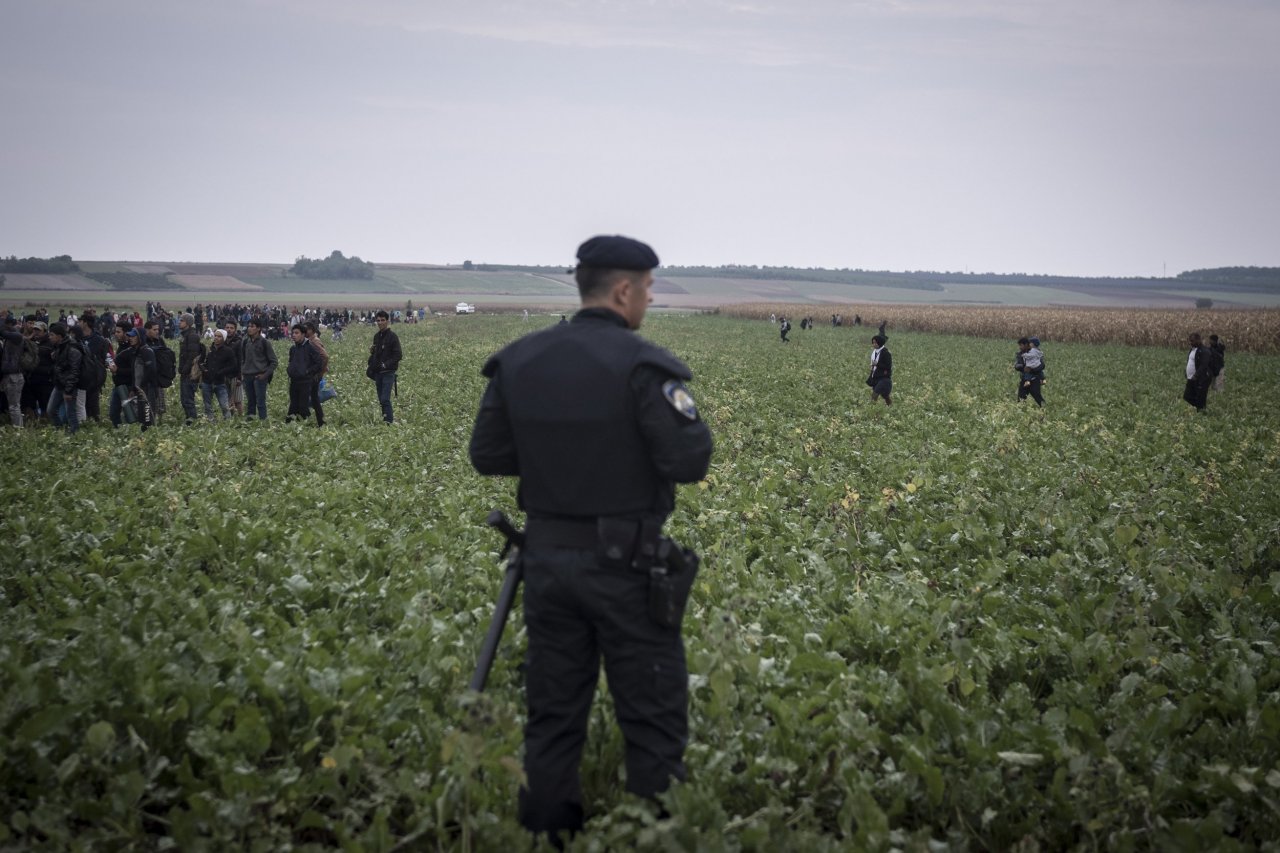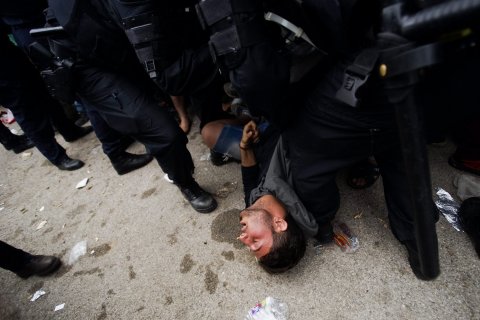
The newest crisis in the Balkans began with a fence rather than a bout of ethnic or nationalist bloodletting. In July, Hungary began building a barrier along its 110-mile border with Serbia, and it plans similar fences on its borders with Croatia and Romania to prevent an influx of refugees. "We are practiced at this now, and we are very good at it," Viktor Orbán, Hungary's prime minister, told a group of foreign journalists in September.
The regional reaction to the fence-building was immediate: Governments in the region sealed more borders, introduced trade bans and began a tit-for-tat torrent of insults. And as the war of words intensified, columns of weary refugees continued trudging northward through these troubled lands. Once again, Europe's poorest and most volatile region was turning into a flashpoint.
It was not supposed to be like this. The wars in the former Yugoslavia ended in 1999. Regional prosperity may be some way off, but peace has held, other than the occasional flare-up. Croatia joined the European Union in 2013. Membership negotiations for Serbia and some of its neighbors proceed. But the migrant crisis has re-animated traumas, highlighted the region's underlying structural weaknesses and raised pointed questions about the integration of Europe's poorest regions. "This crisis has no precedent. Nobody knows how long it will last, and nobody knows how to tackle it," says György Schöpflin, a Hungarian member of European Parliament for the ruling Fidesz party. "The Balkan countries are relatively poor, and this is putting a serious strain on their resources. The EU has to act if it wants to maintain stability."
The response to Hungary's fence-building came quickly, and a domino effect played out across the region. When Hungary closed its doors to the tens of thousands of refugees heading north, Serbia diverted them across its border to Croatia. Zoran Milanovic, the prime minister of Croatia, demanded that Serbia send some of the refugees to Hungary or Romania and pledged that he would not allow Serbia to "make fools of us." (The two countries fought a brutal war in the early 1990s.) Then Victor Ponta, Romania's prime minister, weighed in, saying that Hungarian decision-makers were "no better than those in Syria, Libya or other countries that refugees flee from."
Croatia quickly banned all Serbian vehicles from entering the country. Serbia ramped up the rhetoric in response, declaring that Serbia had been "brutally attacked," even comparing the new regulations to the racial laws imposed by the Croatian Nazi puppet state in World War II. Serbia then banned the import of Croatian goods.
Meanwhile, in Budapest, Orbán's government declared verbal war on Germany and almost all of Hungary's neighbors. The Hungarian prime minister accused Angela Merkel, the German chancellor, of "moral imperialism" in trying to impose her liberal vision on the rest of Europe. Hungarians, he said, "cannot think with German minds." Péter Szijjártó, the foreign minister, accused the Romanian and Croatian prime ministers and the Greek interior minister of lying.
"The regional leaders' exchanges for the past couple of weeks look more like a show of political entertainment than serious debate," says Vessela Tcherneva, head of the Sofia office of the European Council on Foreign Relations. "These societies and states feel that they are threatened and have been abandoned by the EU. The EU was the glue that held them together, so now their neighbors are the easiest targets."
The tensions may yet ease. The current hostility between Croatia and Serbia has been shaped in part by domestic political considerations in Zagreb, argues Tim Judah, a Balkan analyst and author of The Serbs: History, Myth and the Destruction of Yugoslavia. Elections are to be held no later than February 2016. The Croatian economy has been in recession for six years and only now is showing small signs of growth. "The Croatian prime minister's center-left government is looking at the elections," says Judah. "He has not been able to kick-start the economy. The right wing was discredited but is now looking good for a comeback. Taking a tough position against Serbia attracts the right-wing and populist voters."

Voters also know that Croatia's response to the refugee crisis has not been impressive, says Judah. "It was obvious that the flow of migrants would be diverted to Croatia. The Croats said they were ready when the first 4,000 people arrived but then decided they weren't. They looked very limp and unprepared."
The real winners in the Balkan crisis are the Serbs, who have struggled since the end of the regime of Serbian nationalist strongman Slobodan Milosevic to persuade the world that their country is ready to become a full partner in the liberal European project. Serbia has long been a key staging point on the overland route north from Turkey, through Greece and Macedonia. More than 200,000 refugees and migrants have crossed into Hungary this year, most of them entering through the Serbian border. But the contrast in their reception has been stark.
In Belgrade, Serbia, like Budapest, makeshift transit camps have sprung up around transit hubs. In Budapest, municipal authorities provided transit zones with rudimentary facilities, but it was left to volunteer groups to provide food, water and clothes. In Belgrade, the authorities established an information center for refugees in the city center, co-financed by ADRA Germany, a relief agency, the U.N. refugee agency and the local government. Serbian authorities also banned anti-refugee protests by far-right groups. Collective memories of the mass displacement of the Yugoslav wars have also opened people's hearts; many Serbs themselves are refugees from Croatia and Bosnia. When Hungarian police used water cannons and tear gas on refugees rioting on the Serbian side of the frontier, Aleksandar Vucic, the Serbian prime minister, said Hungary was guilty of "brutal" and "non-European" behavior.
Serbia's handling of the crisis has changed perceptions of the country and drawn praise from EU officials, says Braca Grubacic, a Belgrade analyst and publisher of the VIP Daily News Report, a daily news and analysis digest. "For the first time in a long time, Serbia is regarded within the EU as the good guys. The Serbian authorities presented a normal and human face to the world with the way they handled this. We had the migrants here for months; we treated them decently. We did not complain, and we did not demand enormous amounts of money."
Yet as the crisis shows no signs of abating, Serbian hospitality too may have its limits. Right now, most of the refugees and migrants making their way to the richer countries of Western Europe pass through Serbia. The country, with its Muslim and Albanian minorities, is more cosmopolitan than its central European neighbors. But should a substantial number of these people decide to stay in Serbia attitudes could change very quickly.
The speed at which Serbia and Croatia resorted to vicious mutual insults has surprised many observers. But it's also a reminder that the wounds of the past, from the wars of the 1990s back to World War I—a conflict sparked by a Serb assassin who shot dead Austrian Archduke Franz Ferdinand in Sarajevo in 1914—are still easily ripped open. "There are different attitudes to history," says Tcherneva. "There are some places where they remember people as refugees in the 1990s, and others where they remember them as aggressors."
Eventually, this crisis will ease, but the damage done to relations between Serbia and Croatia will not heal quickly, says Grubacic. "This kind of deterioration will not help regional cooperation. It will take a long time to recover and open new channels based on trust and cooperation."
The crisis has also put the EU under enormous strain, highlighting how its institutions work well under smooth conditions but are dismal at responding to such massive problems. The EU has failed to show leadership, says Ines Sabalic, head of Zagreb's representation office in Brussels. "This crisis did not happen yesterday. There was enough time to make plans. Instead, we have had the core countries, the old Europe, reprimanding the new Europe for not being welcoming, forward-thinking and progressive. But the core countries, France and Germany, have failed to provide leadership. We need a compromise not only between Berlin, Paris and London, but also between the old and new member states."
Some in Brussels whisper that the crisis could mark the beginning of the end for the EU. The Schengen zone of visa-free travel—the area in which citizens of EU member states can travel without impediment—has already been restricted as member states reintroduce de facto border controls. That's a huge symbolic and practical blow to the European dream.
But there are others in Brussels and the Balkans who say this crisis might present Europe with an opportunity to draw closer rather than to fragment. If and when the EU discusses how to handle the flow of people from the south, the discussions need to include all countries affected, not just member states, says Tcherneva. "Serbia and Macedonia do not want to be recipients of political decisions. They want to be included in the decision-making process. The western Balkans have to be stabilized and have to be helped. Otherwise the migrant crisis could take these countries down. Hopefully, this will be southeast Europe's moment."














